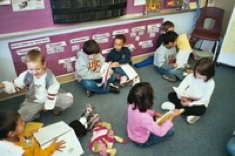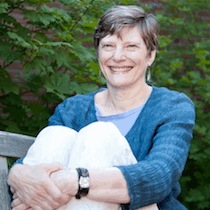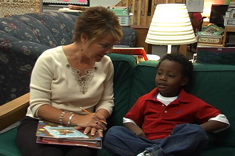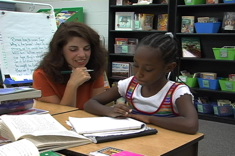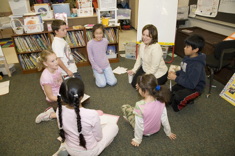When writers put words to paper, they are writing to an imagined audience. The audience might be themselves at another point in time; it might be a specific friend; it might be an anonymous group of readers they never meet. When we institute writing workshops with primary school age writers, it's important to provide genuine audiences for their written work. Young children who write are no different than other authors; they need a chance to share their work through conferences.
.jpg) Many kindergarten, first-, and second-grade teachers struggle with a tension in their writing workshops: How do you introduce the notion of conferencing to young writers, many of whom do not yet "read"? Andie Cunningham and I decide to introduce conferences with her five- and six-year-old authors by modeling with our own writing. Journals in hand, Andie and I sit in the circle before the twenty-three kindergartners at the end of writing workshop time. Andie explains that we will be reading what we wrote today to each other to have a conference. Andie reads her page to me and shows me her picture.
Many kindergarten, first-, and second-grade teachers struggle with a tension in their writing workshops: How do you introduce the notion of conferencing to young writers, many of whom do not yet "read"? Andie Cunningham and I decide to introduce conferences with her five- and six-year-old authors by modeling with our own writing. Journals in hand, Andie and I sit in the circle before the twenty-three kindergartners at the end of writing workshop time. Andie explains that we will be reading what we wrote today to each other to have a conference. Andie reads her page to me and shows me her picture.
.jpg) "Now, Ruth will tell me what she loves about my writing." I tell Andie how her drawing of her dog Bandit reminds me of my own childhood dog Spottie and how I love that she wrote about the way Bandit barked to get her attention. Next, I read my short text about seeing the moon this morning as I drove to school. Andie tells me what she loves about my writing: "I love that you noticed the same thing I did this morning! And I love the words you use to tell about what you saw in the sky."
"Now, Ruth will tell me what she loves about my writing." I tell Andie how her drawing of her dog Bandit reminds me of my own childhood dog Spottie and how I love that she wrote about the way Bandit barked to get her attention. Next, I read my short text about seeing the moon this morning as I drove to school. Andie tells me what she loves about my writing: "I love that you noticed the same thing I did this morning! And I love the words you use to tell about what you saw in the sky."
The children listen as we talk about our writing in these brief conferences.
.jpg)
"Now, it's your turn." Andie pairs the children off, calling out, "Austin, you'll be partner with Nathaniel. Bianca, share your writing with Brooke."
When all the children are in pairs, Andie asks them to share the writing they did today in writing workshop, and tell their partner what they LOVE about the writing.
The photos show the high level of interest and listening that occurred as the children sat with their partners and shared their words and pictures.
Moving from Pairs to Peer Group Conferring
Fast forward two weeks, to the start of writing workshop time. Andie asks three childrento show their writing to the class. Kenya shows the drawing he did of a picture frame, then the letters that he put on the paper. "So Kenya did his drawing first, then he did his writing." Next, Taylor shares her picture. "I didn't write yet." Andie explains, "So she could add more to it. That's what I do.. Your journals are on the table. Go to work, writers."
As the children write, Andie and I circulate, holding individual conferences. Jose has drawn a field of flowers and shows them to me. I slowly say the word, "Flowers," and ask Jose what he hears. "F?" he queries. "Yes, that's what I hear, too. Do you know what letter makes the sound?" Jose shakes his head no. "Do you want to learn?" Silence again, but with a big nod and smile. I show him how to make an F. We practice together several F's and his smile gets wider.
Daniel's page looks like one big scribble. But then he explains it to me in our conference. "That's the castle," he tells me, "and that's the enemies. They go up here, then over here, and knock this out. . ." His story is all recorded on the page, the marks showing the movement and action he envisions.
Andie gives us the one-minute warning to finish up our writing, and we move to the sharing circle. "Think back to when Ruth and I shared our writing and we told each other what we loved about it. Today you'll have time to do that with a friend. Kenya and Refugio, you'll be partners. . ." Andie pairs the students until she reaches Austin S., who asks, "Can we make it maybe be three people today?" "What do you think?" Andie asks the group. A resounding "Yeah!" from the class shifts the plans for the day. Andie quickly regroups the children into threes and helps them sit so they are in mini-circles, then the three-way conferences begin.
I listen in on Carrie, Emely, and Lacey. Lacey begins. She reads her piece, "Me and my mom walk our dog in the yard." She looks up at her conference group and says, "My dog died." Emely: "It's good you wrote about him. I love that you can remember him now." Lacey: "It makes me sad. . ." The three girls sit in silence for a moment. Then, Lacey adds, "And my Grandma died, too." Emely: I'm so sorry about that. Lacey: Now you read, Emely. Emely reads "I love my Grandma," and shows her picture to her audience. Carrie asks, "What do we LOVE about Emely's?"
These young children know how to follow the format of a writing conference, and they know it's okay to add verbally to what they have written, having genuine conversations about their writing. It's time more early writers get the chance for this authentic aspect of writing workshop. They show they can learn from conferences in a range of formats: with their teacher, with a partner, with the whole class, and in small writing response groups.

